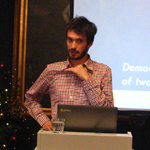Euroacademia Conferences
 Europe Inside-Out: Europe and Europeanness Exposed to Plural Observers (9th Edition) April 24 - 25, 2020
Europe Inside-Out: Europe and Europeanness Exposed to Plural Observers (9th Edition) April 24 - 25, 2020 Identities and Identifications: Politicized Uses of Collective Identities (9th Edition) June 12 - 13, 2020
Identities and Identifications: Politicized Uses of Collective Identities (9th Edition) June 12 - 13, 2020 8th Forum of Critical Studies: Asking Big Questions Again January 24 - 25, 2020
8th Forum of Critical Studies: Asking Big Questions Again January 24 - 25, 2020 Re-Inventing Eastern Europe (7th Edition) December 13 - 14, 2019
Re-Inventing Eastern Europe (7th Edition) December 13 - 14, 2019 The European Union and the Politicization of Europe (8th Edition) October 25 - 26, 2019
The European Union and the Politicization of Europe (8th Edition) October 25 - 26, 2019 Identities and Identifications: Politicized Uses of Collective Identities (8th Edition) June 28 - 29, 2019
Identities and Identifications: Politicized Uses of Collective Identities (8th Edition) June 28 - 29, 2019 The European Union and the Politicization of Europe (7th Edition) January 25 - 26, 2019
The European Union and the Politicization of Europe (7th Edition) January 25 - 26, 2019 7th Forum of Critical Studies: Asking Big Questions Again November 23 - 24, 2018
7th Forum of Critical Studies: Asking Big Questions Again November 23 - 24, 2018 Europe Inside-Out: Europe and Europeanness Exposed to Plural Observers (8th Edition) September 28 - 30, 2018
Europe Inside-Out: Europe and Europeanness Exposed to Plural Observers (8th Edition) September 28 - 30, 2018 Identities and Identifications: Politicized Uses of Collective Identities (7th Edition) June 14 - 15, 2018
Identities and Identifications: Politicized Uses of Collective Identities (7th Edition) June 14 - 15, 2018
Fiscal Deficit or Democratic Deficit? How Finance has Disenfranchised the European Electorates
-
-

-
Presentation speakers
- Davide Bradanini, IMT Advanced Studies Institute
- Download presentation
Abstract:
This paper explores the consequences on the so-called ‘democratic deficit’ of the recent developments within the Eurozone. It argues that the April 2011 Europlus agreement – which consolidates surveillance mechanisms on fiscal and economic policies of member states – together with the wider practices adopted to deal with ‘fiscal irresponsibility’ (neglecting both the asymmetry of the lender-borrower relation and the origin of the fiscal imbalances) represent a further step in the entrenchment of a technocratic neoliberal policy paradigm that is institutionally founded upon what Stephen Gill calls the process of ‘new constitutionalism’. The latter concept expresses the tendency to devolve crucial aspects of socio-economic policy to independent or quasi-independent bodies largely secluded from democratic (popular) accountability, a trend that has been operative since the 1980s and has been at the core of the Maastricht treaty and Economic and Monetary Union (EMU). This disenfranchising of the European electorates is at the root of the declining participation rates in both national and European elections, in which the ‘economy’ has been largely depoliticised and bracketed off, signaling the turn to what Slavoj Zizek calls ‘post-political administration’. The irony is that the medicine might in the end kill the patient: the austerity policies implemented to ‘save the Euro’ might largely contribute to its demise. -


















